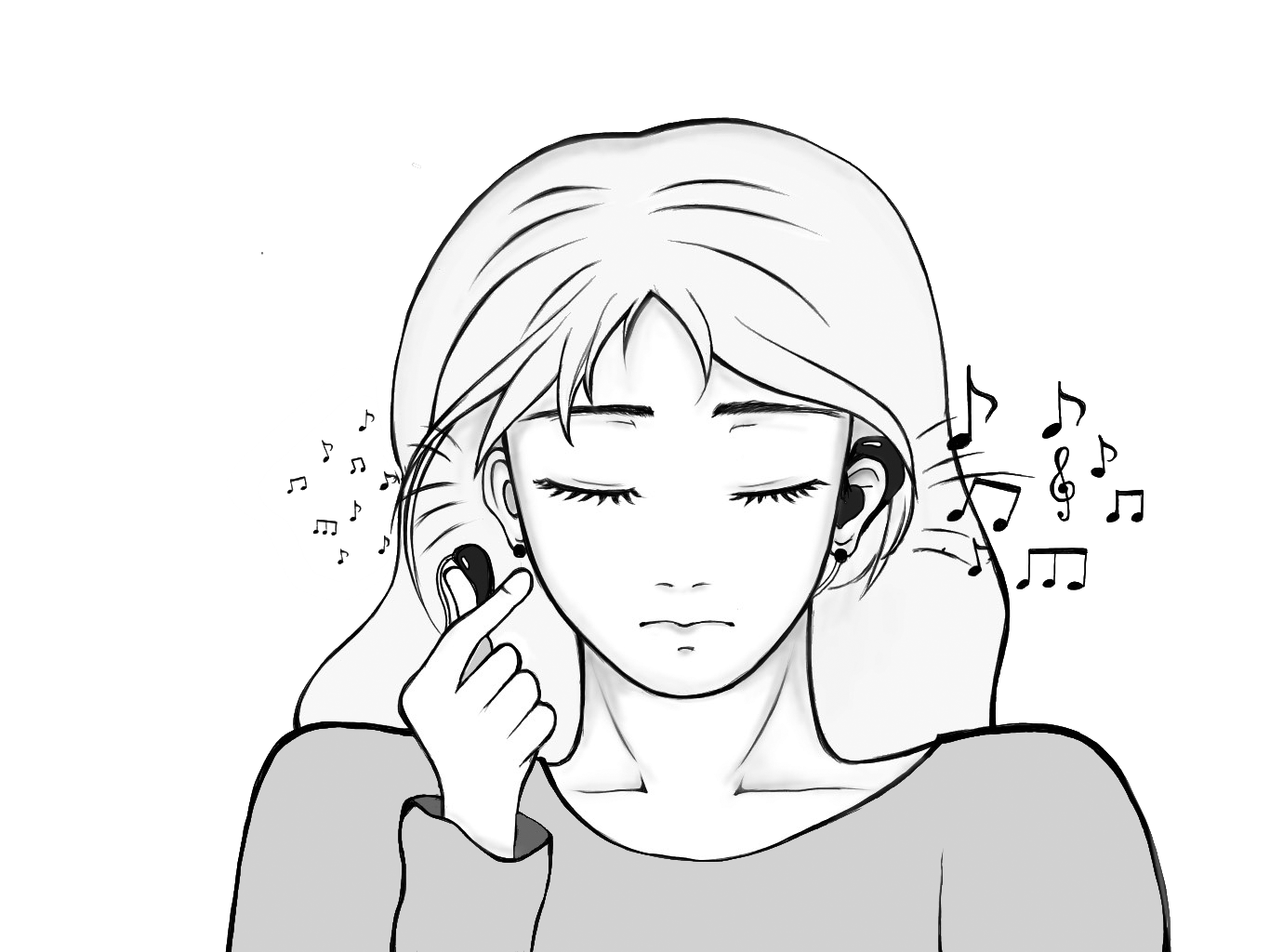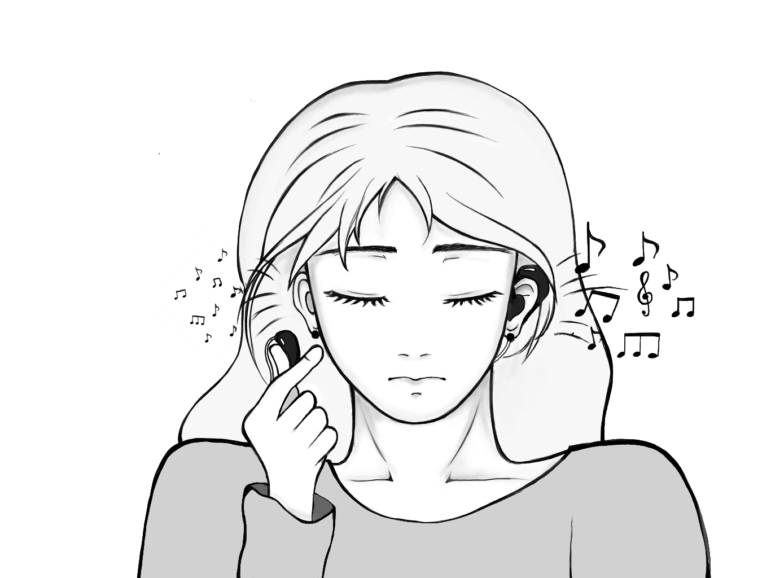

A girl wakes up to muted sounds, like all the volume around her has been turned down. She reaches over to her nightstand, slips in her hearing aides, and immediately, the sounds of her mom calling for breakfast and her brothers trampling down the stairs resonate clearly in her ears. Hearing is something many individuals take for granted, but for those with hearing impairments, it is something that they are constantly grateful for.
Deaf culture is more encompassing than many can imagine. Hearing impairments may affect an individual’s self-confidence and interactions with others, but for most, it’s a matter of adaptation and learning to live with their hearing loss.
Cases for diagnosis can vary with the degree of hearing impairment. Sometimes it develops over time, and other times it is noticed at birth. Senior Amanda Lovell discovered her hearing impairment at a young age.
“I’m partially deaf in both ears,” Lovell said. “When I was 3, I had a high fever, and I was placed in the hospital for five days. They were trying to treat me for a Kawasaki disease, but then I was a half day short, so they released me. A week later, my mom noticed that I had hearing loss, and they took me back, and they think it’s the high fever that burned out the high tones in my ear.”
After the initial loss of hearing, there are different options for support that can help people with hearing impairments or who are considered deaf live with full or partial hearing. Many, like sophomore Anthony Remedios, wear hearing aides or use other systems.
“The FM system, it pairs directly with my hearing aid, so if anyone were to walk into my class, with the exception of PE, they would notice the teacher wearing something around their neck, and that would be the FM system,” Remedios said. “It’s paired directly with my hearing aid and I don’t have to do anything and I just get direct sound the hearing aid and I can hear.”
Alumna Kayla Hori, who has been completely deaf in both ears since birth and majors in Deaf Studies, has a cochlear implant.
“I used to have hearing aids when they first found out that I was deaf, but my hearing aids did not help me at all, so my parents decided to get a cochlear implant [when I was 3],” Hori said. “A cochlear implant is an electronic medical device that replaces the function of the damaged inner ear … When I take off my implant, I cannot hear at all. But with my implant, I can hear about 78 percent on the right ear because I have a cochlear implant on the right ear, and I don’t have a cochlear implant on the left ear.”
Aside from mechanical help, Remedios also appreciates people and programs that support him and his condition.
“I did go to the early start school on Ralston, and that’s a county school for people who are deaf or hard-of-hearing, meant for people who are 18 months to 3 years old,” he said. “That helped me out a lot. It was really beneficial. All my teachers are aware of my issue, and they’re pretty good at making sure I understand everything, answering questions and working with me on things.”
With technology and support, many deaf students can participate in activities that would normally be difficult to engage in without hearing.
While they both have hearing impairments, Lovell and Hori are part of athletic teams, though playing sports does not come without complications. Lovell, who is a softball player, describes the difficulty she had with communicating with teammates.
“When I was younger I played catcher and outfield,” she said. “So in those cases, people are yelling and you can’t hear them at all. I’ll be in the outfield [and] the coach is trying to yell and I’ll have no idea.”
Hori, who mainly plays basketball and soccer, shares similar experiences but says she can lean on her teammates for support as well.
“For basketball, it is hard to hear your teammates or coach on the court because of the crowd and the echo,” she said. “For soccer, it is extremely hard to hear your teammates and coach because the soccer field is big and I only hear the wind when I am running. I have never had an interpreter for sports, so I always have to rely on my teammates and ask them to repeat what the coach is saying or asking.”
While technology and human support can help deaf students or students with hearing impairments physically live normal lives, there is still a mental and emotional struggle from being different. As stated by the Centers for Disease Control and Prevention, only two to three out of every 1,000 children in the United States are born with hearing impairments. Because they are so uncommon, hearing aides or using other means of support may invite unwanted attention or scrutiny.
For a while, this was the case for Lovell.
“The setback is probably being mortified about [having hearing impairments]. It’s like, ‘Ah people are going to be judging me,’ and especially being little, people don’t know what they are,” she said. “In elementary school people would come up and ask me, ‘What’s in your ear?’ or ‘What’s the teacher wearing?’ I feel like if people make comments, then you feel self-conscious, but without them, I don’t even think about it … I feel like I’m only self-conscious when someone makes me feel self-conscious.”
Hori has experienced similar behavior from her friends and classmates as well.
“I was treated differently by my peers when I was a kid,” she said. “Like I mentioned, I would get left out. And I still do. I still get treated differently at times. Sometimes, [people] forget that I am deaf because I speak fluently in English, and sometimes they don’t want nor have patience to repeat what they said.”
Hori is not only sometimes treated differently for being deaf, but has also received some comments that harm conceptions of deaf culture.
“We, deaf people, have been forced by society to use oral communication,” she said. “We have been forced to take speech therapy classes and when we do talk, there’s a lot of ‘sounding like seals’ or ‘retarded’ comments, and I have had comments from people saying, ‘You speak so well for a deaf person!’ To be honest, it is a bad thing to compliment a deaf person. You are complimenting me, but you are insulting everybody else, who may not sound ‘great’ to you. When you can’t hear how you are supposed to sound, it is a complicated thing to learn. So, it is the best way to not mention any of this to a deaf person.”
However, deaf culture can work the other way around, and instead of creating a channel for prejudice, allows for an opportunity to bond.
Lovell has experienced how wearing hearing aids and using an FM system help in building new relationships.
“I feel like people will want to talk to you because [people] ask [about my hearing aids], and that starts the conversation,” she said. “People will be like, ‘Oh she’s kind of cool. She’s different,’ and especially now, people aren’t looking at you weird because you have hearing aids, [and instead] it engages you into a conversation, and you meet more people.”
Hearing impairments have the power to take a daily toll on a person, but many have learned ways to adapt.
“It does affect my daily life,” Hori said. “Not having 100 percent access to information in public is frustrating … I am used to being left out or missing out a lot of information but I always find another way to keep myself busy or find another way to have the access to information.”
Remedios has a similar opinion, and believes the best way to adapt is to learn to accept and cope with the condition.
“Life isn’t just going to be [as easy as] walking down the street all the time,” he said. “No matter what it is, you’re going to encounter some things. We just have to deal with it … and not let it discourage you … Something like this isn’t going to go away, so I learned to deal with it and cope.”



